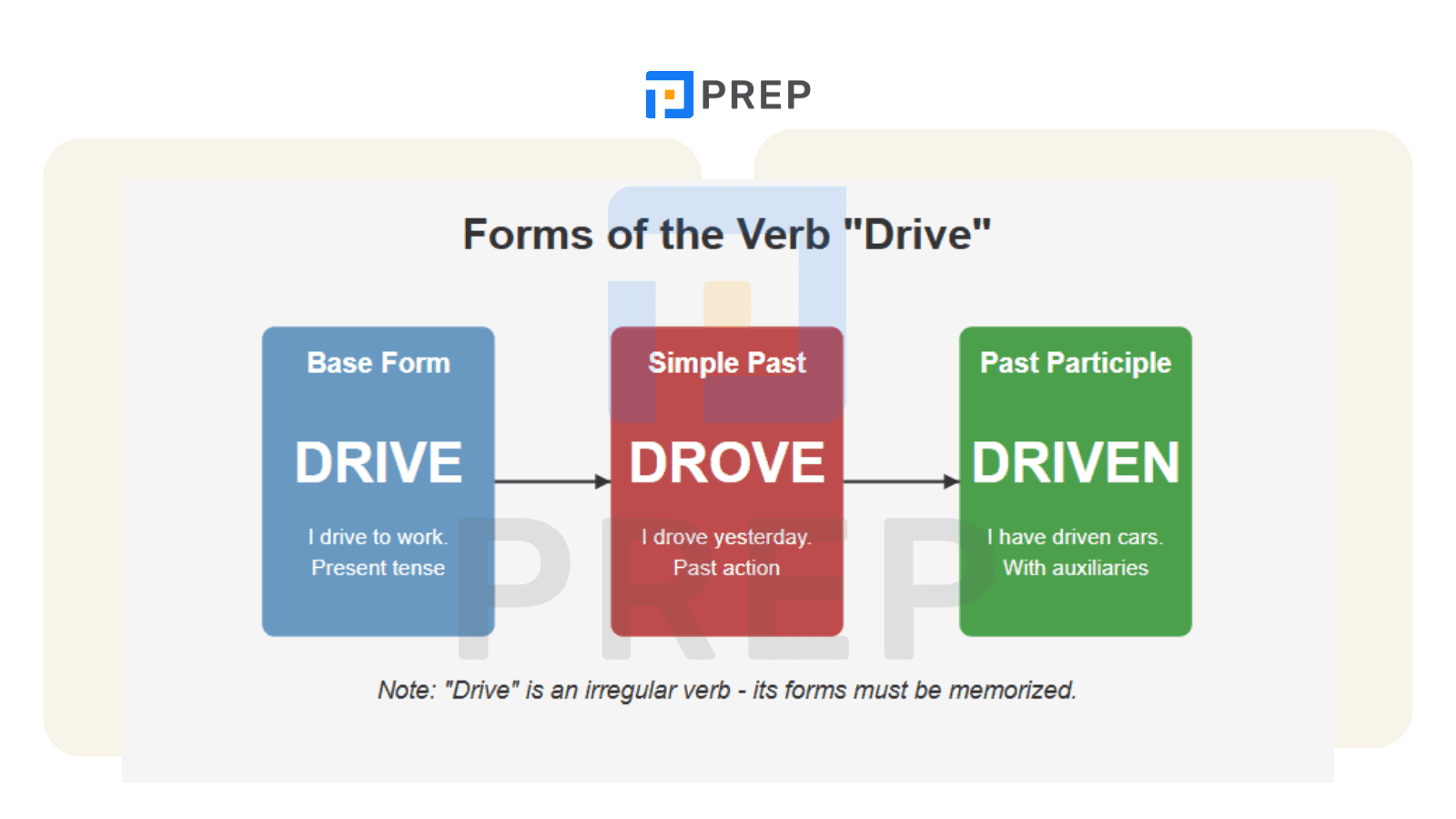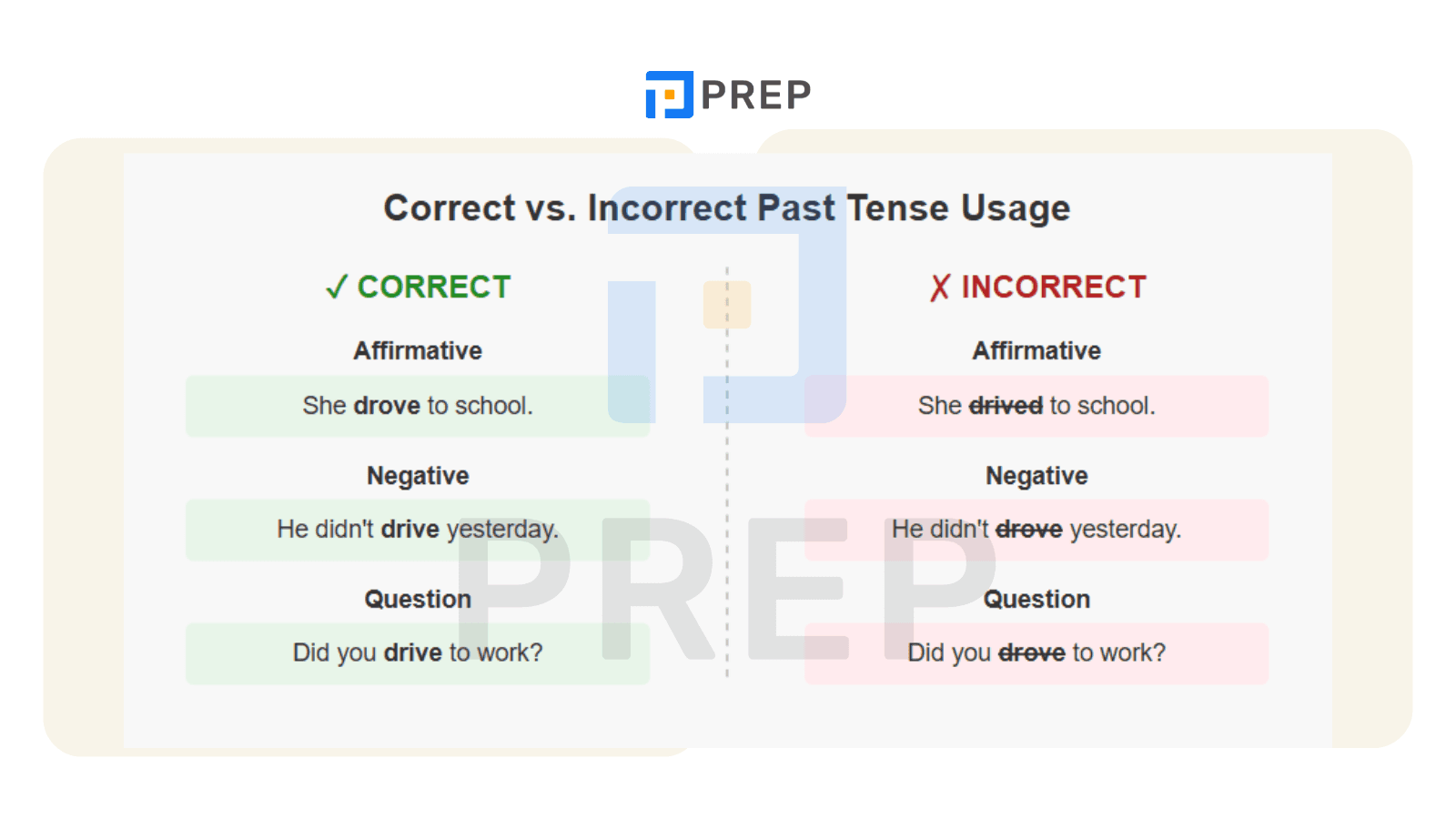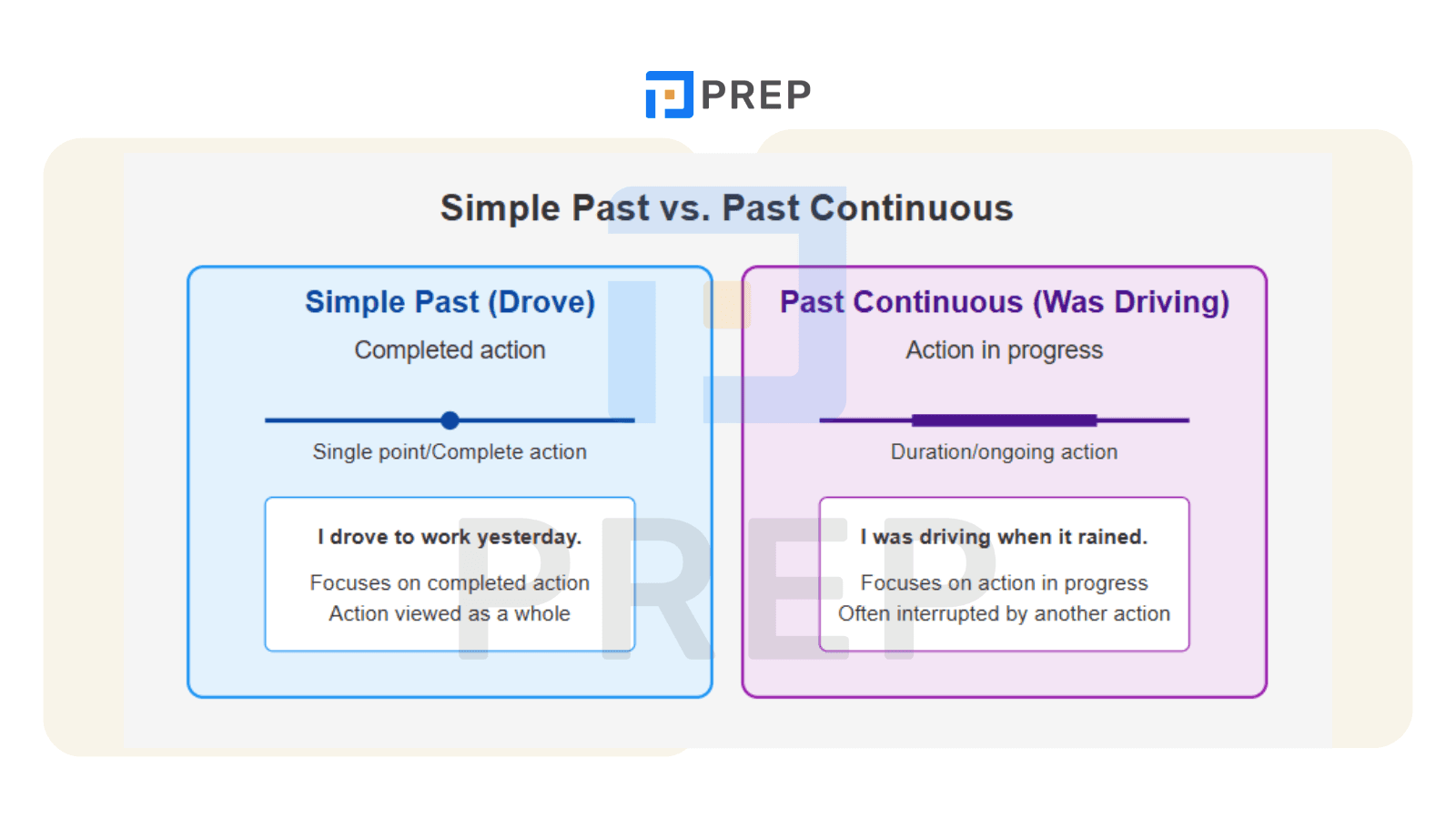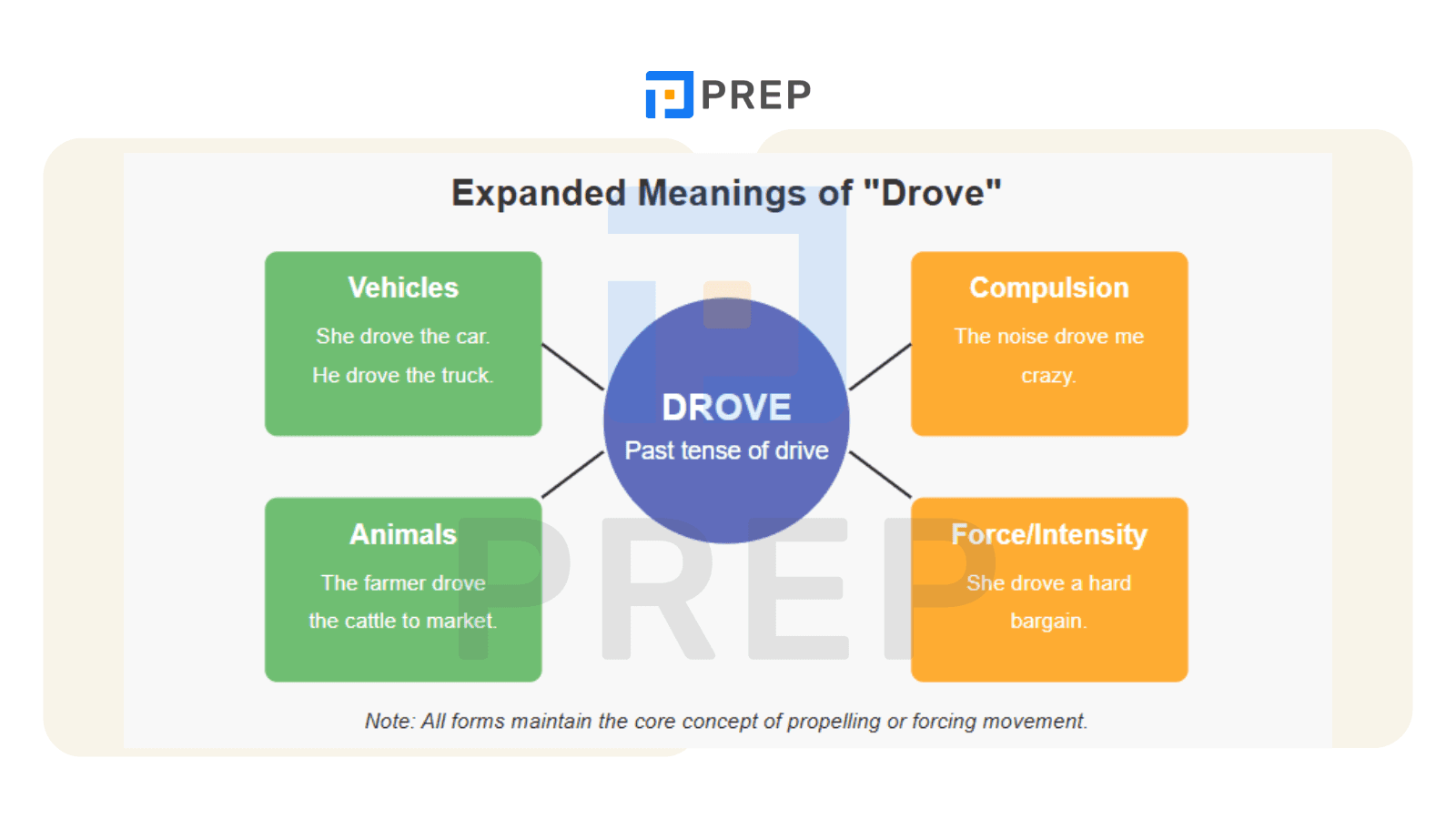Understanding 'Drove': The Past Tense of Drive Explained for English Learners
Have you ever found yourself hesitating mid-sentence, unsure whether to say "I drive," "I drove," or "I have driven"? You're not alone. English irregular verbs create persistent challenges for language learners worldwide, and 'drive' ranks among the most commonly confused. Unlike regular verbs with their predictable -ed endings, irregular verbs follow their own rules—or sometimes, no rules at all.
The past tense of Drive is Drove. This irregular verb form indicates a completed action in the past, contrasting with "drive" (present) and "driven" (past participle). Understanding this distinction helps avoid common grammatical pitfalls that even advanced learners encounter.
The complexity of 'drive' extends beyond just remembering the correct form. It involves understanding when to use 'drove' versus 'driven,' how auxiliary verbs change the equation, and mastering special cases in questions and negatives. For instance, saying "I didn't drove" instead of "I didn't drive" represents one of the most frequent errors among English learners. This stems from applying regular verb logic to irregular patterns—a natural but mistaken approach.
The verb 'drive' belongs to a distinctive pattern group of irregular verbs with similar vowel changes: drive-drove-driven. This pattern repeats in verbs like "rise-rose-risen," "write-wrote-written," and "ride-rode-ridden." Recognizing these patterns creates mental frameworks that make memorization more intuitive and less mechanical.
Beyond its primary meaning of operating vehicles, 'drove' carries numerous literal and figurative applications. From shepherds who drove flocks across fields to emotions that drove someone to action, this versatile verb encompasses concepts of direction, propulsion, and forceful influence. This semantic richness adds depth to your vocabulary while reinforcing your grasp of its grammatical functions.
In this comprehensive guide, we'll explore every aspect of using 'drove' correctly. You'll discover common pitfalls to avoid, master the subtle differences between tenses, and learn practical strategies for incorporating this crucial verb form into your everyday English with confidence and precision.
Ready to master the past tense of 'drive' once and for all? Let's begin with the fundamentals.
- I. Identifying the Correct Past Tense: 'Drove'
- II. Using 'Drove' Accurately in Sentences
- III. Avoiding Common Mistakes with past form of Drive ('Drove' and 'Driven')
- IV. Understanding Nuances: 'Drove' vs. 'Was Driving'
- V. Expanding Your Vocabulary: Other Meanings of 'Drove'
- VI. Frequently Asked Questions (FAQs) about the Past Tense of Drive
- 1. Is 'drived' ever a correct word in English?
- 2. What exactly defines an 'irregular verb' like 'drive'?
- 3. What are some other common English verbs that are irregular like 'drive'?
- 4. How does the meaning change between "He drove the car" and "He has driven the car"?
- 5. Can the word 'drove' be used as a noun?
- VII. Mastering 'Drove': Key Takeaways for Accurate English

I. Identifying the Correct Past Tense: 'Drove'
1. The Quick Answer: What is the Past Tense of Drive?
The simple past tense of the verb 'drive' is drove. This form indicates a completed action that occurred in the past.
2. Why 'Drive' is an Irregular Verb?
In English, most verbs follow a predictable pattern in the past tense by adding -ed to the base form. However, 'drive' belongs to a special category called irregular verbs that don't follow this standard rule. Instead of forming the past tense as "drived," it changes to "drove." This irregularity requires specific attention and memorization, as there is no formula to predict these forms. Understanding irregular verbs represents a crucial step in mastering English grammar.
3. The Key Forms of 'Drive' You MUST Know
To use 'drive' effectively in all contexts, you need to memorize its different forms:
|
Form |
Verb |
Function |
|
Base Form |
drive |
Used in present tense, imperatives, and infinitives |
|
Simple Past |
drove |
Used for completed actions in the past |
|
Past Participle |
driven |
Used with auxiliary verbs (have, had, has) and passive voice |
|
Present Participle |
driving |
Used in continuous tenses and as adjective/noun |
4. Pronouncing 'Drove' Correctly
The word 'drove' rhymes with 'stove' and 'rove.' It contains a long 'o' sound (/droʊv/). The pronunciation differs significantly from the base form 'drive' (/draɪv/), which has a long 'i' sound. This vowel change represents a common pattern in many English irregular verbs.

II. Using 'Drove' Accurately in Sentences
1. Forming Basic Past Tense Statements
When using 'drove' in simple statements, follow the standard Subject + Verb + Object structure. The past tense form stands alone without any auxiliary verbs:
-
I drove to work yesterday.
-
She drove across the country last summer.
-
They drove for eight hours straight before stopping.
The form remains the same regardless of the subject, unlike present tense forms which change for third-person singular subjects.
2. Using 'Drove' with Past Time Expressions
'Drove' naturally pairs with specific time expressions that indicate when the action occurred:
-
I drove to Chicago last weekend.
-
He drove the delivery van yesterday morning.
-
We drove through the mountains two years ago.
These time markers reinforce the completed nature of the action and place it firmly in the past.
3. Creating Negative Sentences (Common Pitfall Area)
To form negative sentences in the past tense, use the auxiliary verb "did not" (or "didn't") followed by the base form "drive" – not "drove." This represents a frequent error point for English learners.
Subject + didn't + drive + Object
-
I didn't drive to the party. (NOT I didn't drove to the party)
-
She didn't drive her new car yesterday. (NOT She didn't drove her new car yesterday)
Remember: The auxiliary verb "didn't" already carries the past tense marker, so the main verb returns to its base form.
4. Asking Questions in the Past Tense (Common Pitfall Area)
Similarly, when forming questions in the past tense, the auxiliary verb "did" carries the past tense, while the main verb remains in its base form:
Did + Subject + drive + Object?
-
Did you drive to work yesterday? (NOT Did you drove to work yesterday?)
-
Where did they drive during their vacation? (NOT Where did they drove during their vacation?)
This pattern applies to both yes/no questions and information (wh-) questions.
III. Avoiding Common Mistakes with past form of Drive ('Drove' and 'Driven')
1. Mistake 1: The Non-Existent Word "Drived"
"Drived" is incorrect and does not exist in standard English. This common error occurs when learners overapply the regular verb rule by adding -ed to the base form. Always remember that 'drive' is irregular, and its past tense form is 'drove.' This requires memorization rather than application of a rule.
2. Mistake 2: Confusing 'Drove' (Simple Past) vs. 'Driven' (Past Participle)
One of the most common errors involves using these two forms interchangeably. Each has its specific function:
-
Drove (Simple Past): Used alone to express a completed action in the past.
-
I drove to Boston last week.
-
She drove a truck for ten years.
-
-
Driven (Past Participle): Always used with auxiliary verbs.
-
I have driven on this road before. (present perfect)
-
The car had been driven only once. (past perfect passive)
-
He has driven since he was sixteen. (present perfect)
-
Remember: 'Drove' stands alone, while 'driven' needs helper verbs like have, has, had, be, was, or were.
3. Mistake 3: Incorrect Forms in Questions and Negative
As mentioned earlier, one persistent mistake involves using 'drove' after 'did' or 'didn't':
-
Incorrect: Did you drove to work?
-
Correct: Did you drive to work?
-
Incorrect: He didn't drove yesterday.
-
Correct: He didn't drive yesterday.
The key rule: When 'did/didn't' appears, use the base form 'drive'.

IV. Understanding Nuances: 'Drove' vs. 'Was Driving'
1. Drive in past simple ('Drove'): Focusing on Completion
The simple past tense with 'drove' views an action as complete, focusing on the entirety of the action rather than its duration or progress:
-
I drove to the store and bought groceries.
This presents the action as a single, completed unit with a clear beginning and end. The emphasis falls on the fact that the action occurred and was completed in the past.
2. Past Continuous ('Was/Were Driving'): Focusing on Duration or Interruption
The past continuous tense ('was/were driving') depicts an action in progress at a specific time in the past:
-
I was driving home when my car broke down. (interruption)
-
We were driving all day yesterday. (duration)
Use this form to emphasize the ongoing nature of the action or to show that it was interrupted by another event. This creates a more vivid, "in the moment" feeling compared to the simple past.

V. Expanding Your Vocabulary: Other Meanings of 'Drove'
1. Literal Meanings Beyond Vehicles
While the most common meaning of 'drove' involves operating motor vehicles, the verb has several other literal applications:
-
The shepherd drove his flock across the field. (guided or directed animals)
-
He drove the nail into the wall with a hammer. (forced or propelled an object)
-
The engineer drove the machinery at maximum capacity. (operated or powered equipment)
In each case, the core idea involves propelling, forcing movement, or directing something.
2. Figurative Meanings: Compulsion and Intensity
'Drove' appears in various figurative expressions where it conveys the sense of forceful influence:
-
Her constant criticism drove me crazy. (caused a strong emotional effect)
-
Inflation drove prices up significantly last year. (forced an increase)
-
The manager drove a hard bargain during negotiations. (pressed forcefully)
-
The lawyer drove the point home with compelling evidence. (emphasized strongly)
These figurative uses maintain the core idea of force or propulsion from the literal meaning.

VI. Frequently Asked Questions (FAQs) about the Past Tense of Drive
1. Is 'drived' ever a correct word in English?
No, 'drived' is never correct in standard English. The past tense of 'drive' is always 'drove,' and the Drive past participle is 'driven.' 'Drived' represents a common error made by applying regular verb rules to an irregular verb.
2. What exactly defines an 'irregular verb' like 'drive'?
An irregular verb changes its form in unpredictable ways when expressing past tense or past participle, rather than following the standard pattern of adding -ed. Each irregular verb has its own unique pattern that must be memorized. Other examples include 'go' (went, gone), 'see' (saw, seen), and 'take' (took, taken).
3. What are some other common English verbs that are irregular like 'drive'?
English contains many irregular verbs that follow patterns similar to Drive past tense and past participle:
-
Write → wrote → written
-
Rise → rose → risen
-
Ride → rode → ridden
-
Speak → spoke → spoken
-
Take → took → taken
-
Begin → began → begun
-
Sing → sang → sung
These verbs often follow historical patterns that have persisted in modern English.
4. How does the meaning change between "He drove the car" and "He has driven the car"?
These sentences use different tenses that convey distinct meanings:
-
"He drove the car" (Simple Past): Indicates a completed action at a specific time in the past. This form often answers the question "What happened?"
-
"He has driven the car" (Present Perfect): Connects a past action to the present. It suggests relevance to now, perhaps indicating experience or a completed action with current consequences. This form often answers the question "What has happened?"
5. Can the word 'drove' be used as a noun?
Yes, 'drove' can function as a noun, though with different meanings than the verb. As a noun, 'drove' refers to a group or collection, particularly:
-
A drove of cattle (a herd being driven to market)
-
Droves of people (large groups or crowds)
For example: "Droves of tourists visited the new museum." This usage derives from the action of driving animals in groups.
VII. Mastering 'Drove': Key Takeaways for Accurate English
1. Final Checklist for Using 'Drove' Correctly
-
Remember that 'drove' is the irregular past tense of 'drive.'
-
Never use '*drived' – it doesn't exist in standard English.
-
Use 'drove' alone for simple past actions; use 'driven' with helper verbs.
-
With 'did' or 'didn't,' always revert to the base form 'drive.'
-
Distinguish between 'drove' (completed action) and 'was driving' (action in progress).
2. Your Next Step in Mastering English Verbs
Continue building your irregular verb knowledge by practicing the past tense of Drive - Drove in different contexts. Try creating your own sentences with the various forms of 'drive' and check your understanding with native speakers or qualified instructors. This deliberate practice will help cement your understanding and build confidence in using these forms correctly.

Hi I'm Chloe, and I am currently serving as an Product Content Administrator at Prep Education. With over five years of experience in independent online IELTS study and exam preparation, I am confident in my ability to support learners in achieving their highest possible scores.
Comment
Premium content
View allPersonalized roadmap
Most read












